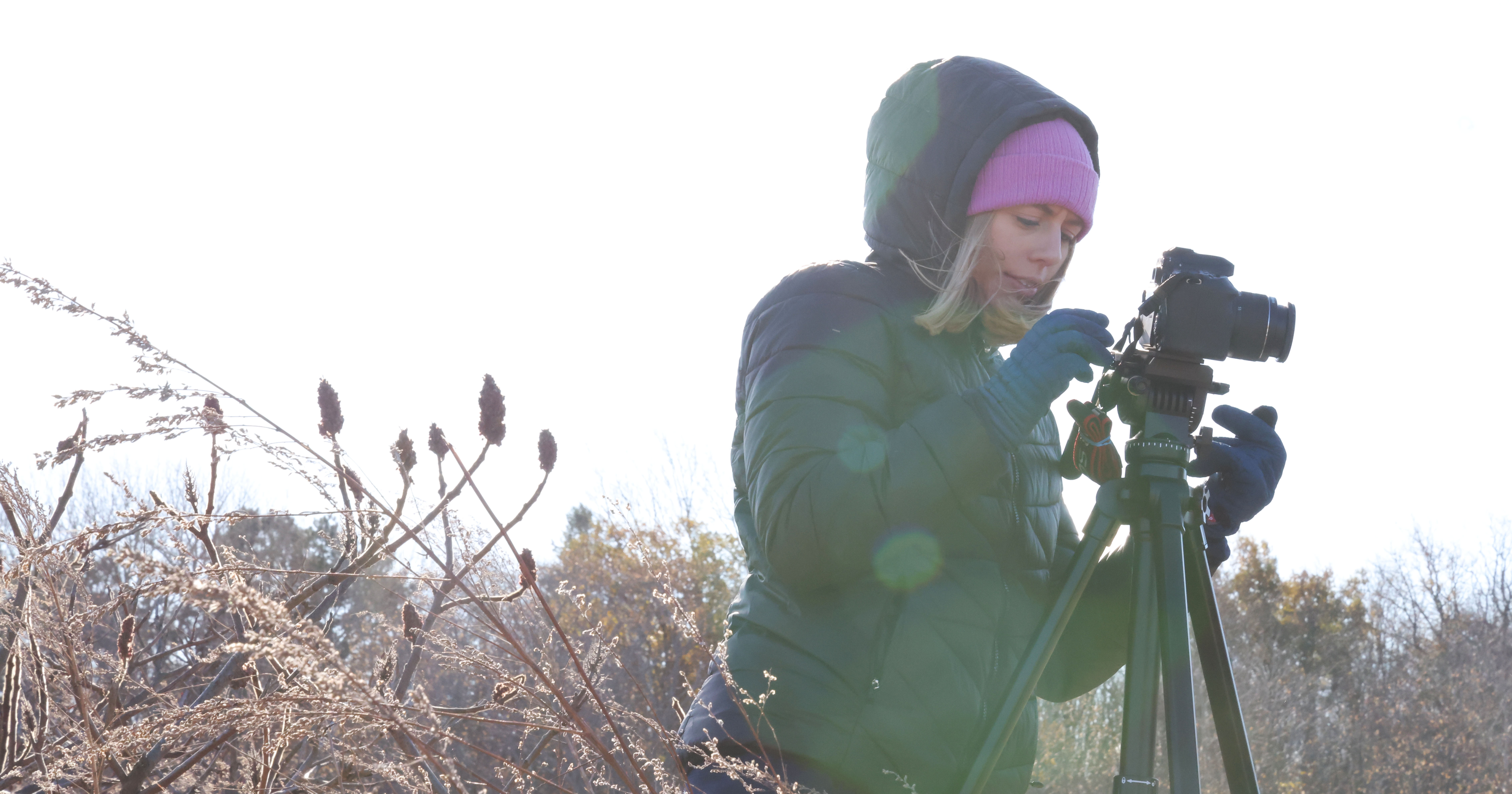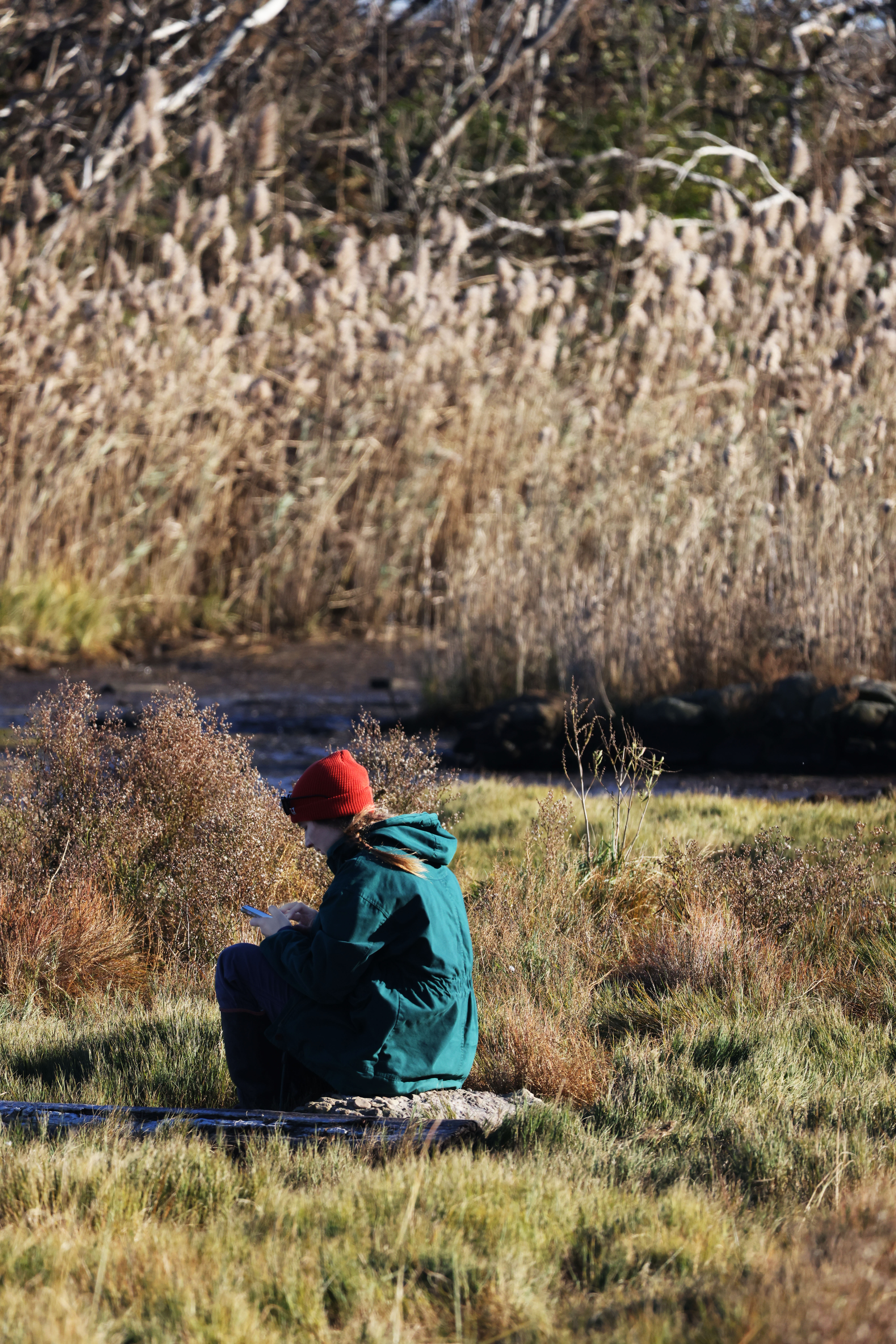Last updated: January 23, 2024
Article
The National Parks of Boston hosts its first Climate Conservation Corps
The National Parks of Boston (NPB), partnered with Conservation Legacy and AmeriCorps, welcome the Climate Conservation Corps (CCC), a group of young adults working to address climate change through science, adaptation, mitigation, and communication. The team is gaining real-world experience relevant to conservation, while furthering the park's mission and commitment to climate resiliency.

NPS Photo / E. Bernbaum
Meet The Team
This inaugural NPB Climate Conservation Corps consists of five young adults passionate about climate response work.
Rachel Muller, Program Coordinator
Rachel Muller comes to the National Parks of Boston from Orlando, Florida, where she was the Sustainability Planner for the City of Titusville. As a Sustainability Planner, Rachel helped the City of Titusville implement resilient and sustainable strategies in city operations. Rachel is passionate about finding local solutions to mitigate and adapt to climate change and working with communities to address environmental and social vulnerabilities. Rachel received her B.A. in Political Science and B.A. in Economics from the University of Florida, and she holds a Master of Urban and Regional Planning with a concentration in Environmental Planning from the Georgia Institute of Technology. In her free time, Rachel enjoys traveling to new places and she looks forward to exploring the National Parks of Boston and the Harbor Islands!
Mason Bunker, Strategic Planning Coordinator
Mason Bunker graduated from Bates College in May of 2023 with a Bachelor of Arts in Environmental Studies. During his undergraduate studies, he researched carbon sinks and blue carbon through an interdisciplinary lens, ultimately writing a thesis on the potential benefits of carbon sequestration through mineralization. He is thrilled at the opportunity to continue the crucial work of carbon storage and the role salt marshes play in this phenomenon. His professional experience includes stewardship work at Rangeley Lakes Heritage Trust doing data collection, GIS mapping, invasive plant monitoring, and trail work. Mason fell in love with the outdoors at a young age by visiting family in Downeast Maine and has dreamed of working for the National Parks Service from a young age. When he is not at work, Mason can be found birding, ice skating, or doing crossword puzzles. He is thrilled to join the NPB CCC and respond to climate change.
Ellie Bychok, Crew Member
Ellie Bychok comes to the National Parks of Boston with a Bachelor of Science in Environmental Conservation and Sustainability. She gained experience working in the recreation management industry at Mt. Agamenticus in York, Maine. There she did trailwork, used stormwater drainage techniques to focus on erosion control, removed invasive species, as well as provided educational outreach to volunteers and visitors of the mountain. Ellie has a passion for environmental sustainability and climate change communication, and she says, "I am thrilled to have this opportunity to take climate action and work with so many different people within the park and community!"
Evan Paris, Crew Member
Armed with a degree in biochemistry, Evan Paris initially began his career in science working as a post-baccalaureate in a plant microbiology lab at the Carnegie Institution for Science. However, the laboratory left Evan feeling disconnected from tangible, real-world impacts. Now, through joining the NPB CCC, Evan is excited to be using his scientific skillset to tackle the urgent and complex issues of the climate crisis. He says, "humanity has long treated the Earth as its personal playground, now it is our responsibility to clean up after ourselves."
Olivia Smith, Crew Member
Olivia graduated from the University of New Hampshire with a Bachelor of Science in Marine, Estuarine, and Freshwater Biology. She has spent multiple seasons as a biological field technician, working with birds in Florida and New England. At the National Parks of Boston, she is excited to be working in a role that is exclusively focused on taking climate action. She says that, "climate change is one of the most urgent threats we face today, and I feel some responsibility to make a difference where I can, so I am really grateful to be doing this work with the NPB CCC."

NPS Photo / E. Bernbaum
Projects
The National Parks of Boston is home to multiple sites with valuable historic, natural, and cultural resources. The group is evaluating how these important assets will be affected by climate change and what action can be taken to conserve them. Since their September commencement, the NPB CCC has developed and is working on four projects:

NPS / E. Bernbaum
Salt Marsh Adaptation Planning
The team is developing a monitoring program across the Boston Harbor Island salt marshes. They are working to GPS salt marsh extents and identify different marsh zones. These data can be referenced against historic records to understand how salt marshes have migrated among the islands over time. The group is also establishing a photo series to qualitatively examine how marsh topography changes after storm events. Ellie Bychok is the crew member leading the team on this project. Ellie says,
we have been so excited to get this project started, to share with the park, partners, and community the value of salt marshes to Boston Harbor. Salt marshes are one of the most important carbon storing ecosystems in this region, and they are at risk because of sea level rise. Not only do we want to mitigate stressors at existing salt marshes, but we also want to monitor over wash extent, after storms, at areas that have potential to foster salt marsh migration. We are working to tell a story of what the islands could be gaining and losing due to future sea level rise.
Climate Resilient Plant Palette
Boston National Historical Park includes numerous green spaces with manicured trees and plants. The CCC is developing a system to identify species that foster native biodiversity and will be resilient to future conditions resulting from climate change. The recommended species can be used by park facilities for new plantings and landscaping decisions, such as identifying a replacement for the recently felled Charlestown Navy Yard Tuliptree. Evan Paris, the crew member leading this project, says,
this project is important because it lies at the intersection of climate adaptation and mitigation. We are working to ensure that the life we introduce to the park has the capacity to survive here for years to come, and in doing so, we are increasing the amount of carbon that the park withholds from the atmosphere.

NPS Photo
Energy Efficiency Assessment
A National Park goal outlined in the Green Parks Plan is to have net-zero emissions by 2045. To assist in achieving this objective, the NPB CCC will be examining historic buildings across Charlestown Navy Yard to identify and correct areas of high energy loss. Crew member Olivia Smith is this project's lead. She says,
Working to actually mitigate, or minimize the cause of climate change, is so important and is really at the center of this project's purpose. It feels good to know that our work will make the Boston National Historical Park more climate friendly while maintaining the historical integrity of these sites.

NPS / R. Muller
Communication, Education and Outreach
The team regularly participates in community education events. Climate Haikus is an activity developed by the NPB CCC, during which guests are welcomed to use poetry to express their anxieties around climate disasters. Through this form of self-expression, NPB CCC hopes for positive change.
Check out this article to learn more about the Climate Haikus activity.
Upcoming Independent Projects
Later in the corps' 1-year term, crew members will develop and execute independent projects. This allows the individuals to expand and exercise their skillset while exploring climate-relevant topics they are most passionate about. The National Parks of Boston are glad to host the NPB CCC and are excited to see what they will accomplish during their time at the parks.
Contributed by: Olivia Smith, National Parks of Boston Climate Conservation Corps Crew Member
